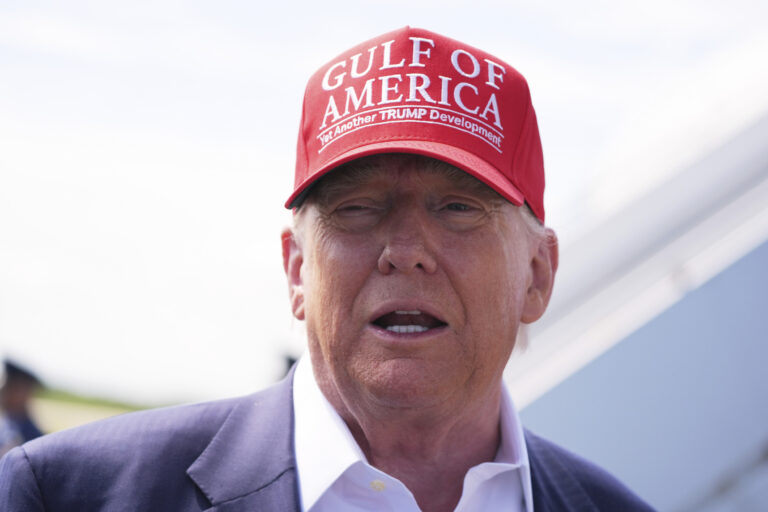President Donald Trump’s approval rating has taken a sharp dive, marking a significant shift with his own Republican base.
The latest Overton Insights/Targoz Market Research poll, conducted between June 23 and 26 among 1,200 registered voters, shows a notable decline. In June, Trump’s approval stood at 79 percent with 19 percent disapproving, yielding a net approval of +60. This marks a drop from March, when his approval rating was higher at 86 percent, with only 13 percent disapproving, resulting in a net approval of +73.
Both polls had a margin of error of +/- 2.7 percentage points.
Why It Matters
This decline in Trump’s approval rating among Republicans could signal growing dissatisfaction within the party’s core supporters, which could weaken his influence over the GOP’s direction and strategy. As the 2026 midterm elections approach, a faltering base could impact candidate endorsements, voter turnout, and overall party unity.

Evan Vucci/AP
What To Know
Other polls have also shown Trump’s approval rating dropping among Republicans.
A YouGov/Economist poll, conducted June 20-23 among 1,590 adults, showed that Trump’s approval rating among those who voted for him in 2024 stood at 83 percent, while 14 percent disapproved, giving him a net approval rating of +69 points, down from +80 last month. However, the most recent poll, conducted between June 27-30 put his net approval among his 2024 voters back up to +72 points, with 86 percent approving and 14 percent disapproving. The poll had a margin of error of +/-3.5 percentage points.
Political commentators have put Trump’s declining popularity among his own base down to his decision to carry out airstrikes on three nuclear facilities in Iran, which polls have shown most Americans do not approve of. In retaliation, Iran fired missiles at a U.S. military base in Qatar on Monday.
The rapid escalation has spotlighted the risks of deeper U.S. military involvement in the Middle East and highlighted the evolving nature of American foreign policy under Trump, who once promised to protect “America’s vital interests” without engaging in “endless wars” overseas.
“Trump’s recent actions in Iran have done little to reassure the MAGA base that he’ll steer clear of another endless war in the Middle East,” Thomas Gift, founding director of the University College London Centre on U.S. Politics, told Newsweek, warning that “a core pillar of Trump’s 2024 appeal was the idea that ‘America First’ meant staying out of foreign conflicts,” but now “that promise is starting to ring hollow.”
Peter Loge, a political communications professor at George Washington University and former adviser to former President Barack Obama, added that Trump is “pursuing policies people don’t like, while ignoring things people care about,” arguing that “most voters mostly want things to work” — like affording groceries, gas, and health care. Instead, Loge says, Trump’s decisions — from sending Marines to Los Angeles to reengaging in the Middle East — are unpopular distractions that threaten to “jack up inflation” and put health care “out of reach of millions.” In the end, Loge says, “President Trump likes people to pay attention to Donald Trump. Voters would rather pay attention to their families,” he told Newsweek.
The drop in Trump’s approval rating among Republicans reflects a broader national trend, with his support slipping across the entire electorate. Some polls now show his approval rating reaching a record low for his second term, highlighting deepening dissatisfaction beyond just his party’s base.
The latest ActiVote survey, conducted June 1 to 30 among 523 adults, found Trump’s national approval at 45 percent and disapproval at 52 percent—putting his net approval at –7 points, his worst showing since returning to office.
Despite this record low for his second term, Trump’s current approval still outpaces his own first-term average, which ActiVote tracked at 41 percent. It also remains slightly higher than former President Joe Biden’s full-term average of 41 percent and Biden’s final-year average of 40 percent.
Other polls paint an equally bleak picture. An Ipsos/Reuters poll, conducted June 21 to 23 among 1,139 registered voters, found Trump’s net approval at –16 points (41 percent approve, 57 percent disapprove)—slipping from –12 the week prior. The American Research Group’s June 17 to 20 poll among 1,100 adults showed his net approval plunging to –21 points (38 percent approve, 59 percent disapprove), down sharply from –14 in May.
But some polls suggest Trump’s approval rating has ticked up slightly after a period of steady decline. The latest Navigator Research poll found his approval rose to 45 percent from 43 percent in early June. A YouGov/Economist survey showed a modest increase to 42 percent, up from 40 percent. Morning Consult’s poll found his approval at 47 percent, a slight improvement from 45 percent in May. Similarly, a Marist/NPR/PBS poll put Trump at 43 percent approval, up from 42 percent in April.
And other polls even suggest that Trump’s approval rating among Republicans is at historic highs.
According to CNN pollster Harry Enten, Trump’s average approval rating currently sits at 63 percent, up from 53 percent in July 2017 during his first term. Enten’s analysis also shows that Trump is more popular among Republicans than any other GOP president five months into their term in recent history, including Ronald Reagan.
“It’s history making,” Enten said. “He is more beloved by this Republican base than any Republican base has loved any GOP president five months in. It is history-making.”


